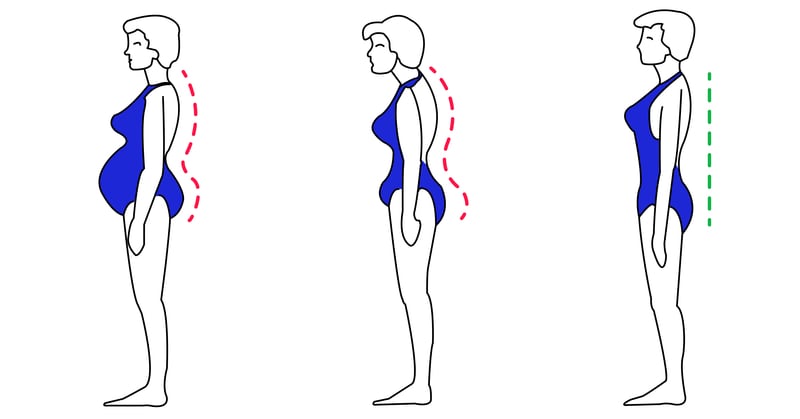Stand Up Straight! How Good Posture Boosts Healthy Living…

You probably heard your parents say “stand up straight” so many times you now disregard it. You may not even realize your posture is off because it’s not something you link to causing you pain or disrupting your life. But, truth be told, poor posture can wreak havoc on you from a variety of angles.
What is posture, exactly? According to the Merriam-Webster Dictionary, posture is “the position or bearing of the body whether characteristic or assumed for a special purpose.” Basically, posture is how you hold your body during various activities and at rest.
Why Is Good Posture Important?
Good posture is important when it comes to keeping your body healthy, both physically and (surprisingly) mentally.
Dr. Tomi Ann Roberts, the lead author of one study on posture, concluded: “An upright posture makes people feel dominant and successful, which in turn improves their ability to relax and focus on problems.”
Posture is important when it comes to maintaining good physical health as well. It will help you reduce strain on your muscles, bones, joints, ligaments, and tendons when your body is in alignment. Think about it, if you’re driving a car that’s slightly misaligned, what happens? You get uneven wear and tear on the tires, and it puts undue pressure on other mechanical and electrical components that would usually not experience such stressors.
Well, the same type of thing happens with your body. Misalignment can lead to stress and strain that can be compounded when you walk, run, exercise, or lift weights. You could even be building muscle on a skewed frame, which can exacerbate problems for you in the future.
What Are the Benefits of Good Posture?
- Look slimmer—enough said.
- Look taller—again, enough said.
- Better breathing—by standing straight, you’ll lift your ribcage and open up your lungs, allowing for increased air intake.
- Improved digestion—by standing erect, you take pressure off organs and allow your body to function as it should. Your stomach and intestines are not compressed and are able to expand for full function.
- Less injury—with posture intact, muscles, tendons, and ligaments can stretch to their normal length, and your body can function at its maximum capacity with full range of motion.
- Flexibility—when you stand up straight, you allow your muscles to lengthen to their normal state, which helps prevent stiffness and pain.
- Better mental clarity—yes, it’s true. Studies show good posture puts you in a better mood and can even improve your ability to concentrate!
Now that you know how important good posture is for just about, well, everything, how can you ensure you maintain the best posture possible?
What Not to Do
Round your shoulders forward while slouching and working on your computer—instead, make sure you sit up straight, place your feet on the floor, raise or lower your chair so your elbows form a 90-degree angle as you type.
Slouch while sitting or standing—this is easy to do if you’re not aware of your posture. Simply remembering to straighten up will be helpful. As much as possible, try to keep your weight balanced evenly on both legs.
Never stretching—this will cause your muscles to become shorter and more inflexible. As you can imagine, this is a recipe for pain and poor posture as your body is pulled out of proper alignment.
What Does It Look Like When You Have Good Posture?
Well, when you’re standing, your head is facing forward and centered over your shoulders, your shoulders are pulled back and down, not hunched upward or forward. When you have good posture, your chest is held slightly up and outward while your tailbone is slightly tucked. Essentially, your ears, shoulders, hips, and ankles should form a straight line.
A good test is to stand tall next to a wall with your feet about six inches away from the wall. Next, while facing forward, press your body to the wall so the back of your head, your shoulders, back, and buttocks touch the wall. Your weight should be evenly distributed over both feet, i.e. not with one hip thrust out to the side and bearing the bulk of your weight. This is what proper posture should look and feel like.
A little awareness can go a long way. Once you’re thinking about your posture, you can improve it and maintain it through flexibility practices like yoga. Also, making sure you get up, stretch, and walk around at least once every hour while working at a desk will be helpful. It’s also said that simply raising your chin will help align your entire body. And, as always, a good resistance training regimen will go a long way toward helping you develop and maintain good posture.
Bottom line: Because a good posture makes you look taller and slimmer, feel more confident and productive, and improves overall health, it’s worth checking in on throughout the day. Hopefully now that you’ve finished this article, you’re sitting or standing up straight!






